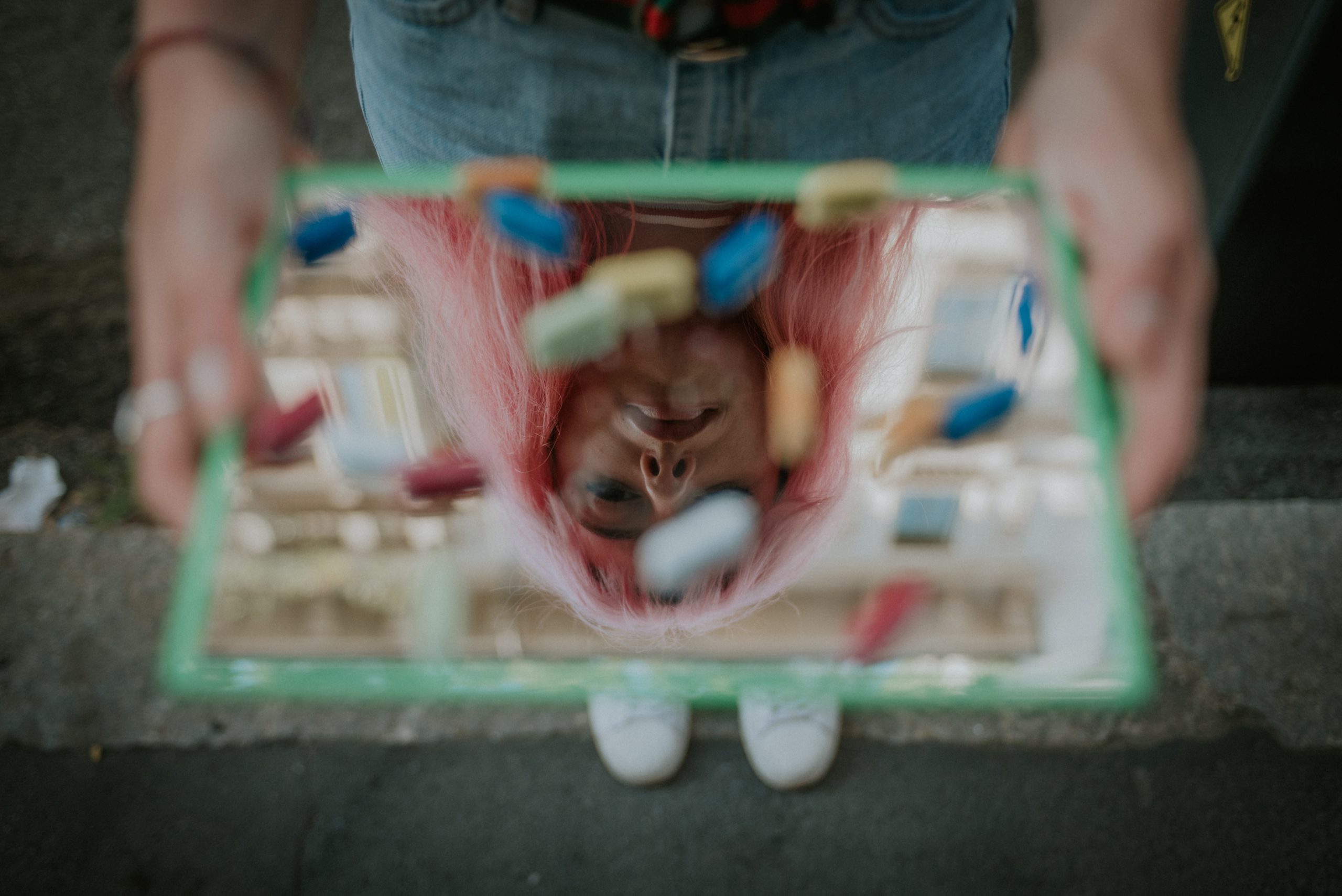
It is natural to seek comfort to manage our emotions. Though, everything in moderation, right? Life can become too much and push us to engage in compulsive behaviours or consume substances to help us cope with overwhelming feelings. Initially, it’s dependence and then a harmful addiction. Unfortunately, the stigma of addiction doesn’t allow us to recognise how we’ve all dipped our toes or swam in these waters. The first step to recovery is acceptance.
It is natural to seek comfort to manage our emotions. Though, everything in moderation, right? Life can become too much and push us to engage in compulsive behaviours or consume substances to help us cope with overwhelming feelings. Initially, it’s dependence and then a harmful addiction. Unfortunately, the stigma of addiction doesn’t allow us to recognise how we’ve all dipped our toes or swam in these waters. The first step to recovery is acceptance.

Photo by Matteo Badini on Unsplash

Photo by Matteo Badini on Unsplash
What’s your drug of choice? The one you find comfort in after a tough day. You know it, the one you can’t stop making excuses to consume. Maybe a piece of chocolate or a little bit of heroin. Now I’m pointing the finger at you but pointing three back at myself. So, let’s open this safe space; welcome addicts anonymous! During this AA meeting, I want to make you aware that addiction is just around the corner for anyone. For that, we’ll need to investigate the aetiology: the role of genes, the nervous system, and the environment. But don’t worry; we’ll also address and overcome the stigma by sharing individual accounts of addiction and recovery. Finally, I’ll show you how the personal and societal approach to rehabilitation must shift to a humane approach. Still, what exactly is addiction?
Anna Lembke, a psychiatry professor at Stanford University School of Medicine and the director of the Stanford Addiction Medicine Dual Diagnosis Clinic, defines addiction as “the continued compulsive use of a drug or behaviour despite harm to self or others” (Roll, 2021). So, what causes someone to compulsively engage in something harmful? The puppeteer behind these behaviours is the neurotransmitter dopamine. Dopamine plays a role in the brain’s reward circuit and is responsible for feeling pleasure and motivation (Beninger, 1983). This means that addiction does not differentiate between watching pornography, doing drugs, binge eating, doom scrolling, consuming caffeine, and other addictions as long as dopamine and the associated feeling are involved (Schultz, 2016). So, don’t think you’re off the hook. Addictive substances and behaviours cause an increase in dopamine, though repeatedly raising the threshold for the same feeling of satisfaction, leading to emotional lows when sober, thus creating a vicious cycle. So, why not avoid drugs from the start?
The question brings us back to the age-old nature-nurture debate. Genes influence a person’s experience through factors such as personality, stress sensitivity, and pleasure aversion, all of which add risk for emotional dependence on drugs (Volkow & Muenke, 2012). In addition, family studies show that relatives of family members with drug disorders have a higher risk of substance disorders than relatives of patients with psychiatric conditions and unaffected controls (Merikangas et al., 1998). Genes have a direct impact on our neurobiology. Though it is uncertain whether pre-existing abnormalities or drug abuse precede the other. This causal link is prevalent in the self-medication hypothesis, which suggests that people use substances to reduce their psychiatric symptoms. The theory highlights the comorbidity between depression and drug dependence and how both disorders alter neurotransmitter functions in the limbic system (Markou, 1998).
“Addiction does not care who you are; if you are in pain, you will seek comfort.”
However, genetics only reflects the combined impact of environmental factors. So, what would cause one to start substance dependence in the first place? In our society, underlying denial regarding the significance of trauma in addiction leads to ignorance about the influence of childhood experiences on behaviour. To demonstrate, a longitudinal study found a general causal chain between the experiences in childhood, how these affect the developing mind in adolescence and the later emergence of substance use disorders in adulthood (Zarse et al., 2019). Ultimately, the psychology of addiction rests on the attempt to numb emotional pain while seeking something to feel alive. For this reason, people find comfort in consumption.
Addiction does not care who you are; if you are in pain, you will seek comfort. For instance, the artist and musician David Choe explained the emotional interpretation of addiction on The Rich Roll Podcast. Choe explains that after attending all sorts of addict anonymous meetings, he realised something. Even after winning millions gambling, he felt the same as other addicts who had nothing. Eventually, realising that the rush of pleasure in his gambling came from losing. That is why he found it frustrating when people asked why he simply didn’t quit? Because it is not rational. This highlights another misunderstanding: why people cannot merely choose to willpower their way out of addiction. Self-control derives from the intelligent mind, which is quickly overwhelmed by our emotional side. Cognitive control derives from the prefrontal cortex, which is much weaker than the limbic system, that is responsible for behavioural and emotional responses (Menon & D’Esposito, 2021). Whether you like it or not, we are animals motivated by emotion, and only a fraction of the time are we rational beings. This is evident by the relationship between the neural circuits disrupted by abused drugs and those underlying self-control (Baler & Volkow, 2006).
“The change would not only help addicts but also free up self-understanding to open the conversation within yourself.”
We have explored the origins and understand the reasoning behind addiction; now, it is time to confront the stigma. An expert in the field, physician and author Dr Gabor Maté advocates that the problem and solution to addiction lie in childhood trauma and its lifelong impacts. Maté addresses addiction as a social issue from a legalistic point of view, in which addicts are perceived as criminals who are punishable for their drug consumption. Albeit with everything we know, how can this be the case? Addiction is not a choice! We must treat addiction as a response in which people self-medicate to cope with mental health, whether derived from genetic susceptibility, neurobiology, or trauma. We must shift the inhumane view to a compassionate approach. To understand that the root could be genetic susceptibility, but the wound that hurts is trauma. And resolve drug dependence with the intent to treat, not punish. The change would not only help addicts but also free up self-understanding to open the conversation within yourself. If it is the case, you are not a criminal; you are human and need help, as does everyone in this meeting. However, before we can reach out for support, we must cultivate awareness.
Ultimately, do you consume a substance or compulsively engage in a behaviour to cope? Then you, too, my friend, are an addict. Possibly not in the sense of addiction as a brain disorder, but as compulsive use that leads to unconscious harm. Remember, addiction does not bring your humanity into question. There is no shame in this, but we must be able to recognise it. Again, while it may not harm others, it may harm yourself. Reflect on this. For example, if you said you would not do something and ended up doing it. Pay attention to this. Put in the work for yourself and for your future. It’s complicated; it’s not that easy. But no one can make the change for you. Recovery is always an option. To close this session, I’d like to thank you for sharing your time and applaud your courage in being here. Congratulations on your first step to recovery: acceptance. See you at the next meeting. <<
References
-
Baler, R. D., & Volkow, N. D. (2006). Drug addiction: The neurobiology of disrupted self-control. Trends in Molecular Medicine, 12(12), 559–566. https://doi.org/10.1016/j.molmed.2006.10.005
-
Beninger, R. J. (1983). The role of dopamine in locomotor activity and learning. Brain Research Reviews, 6(2), 173–196. https://doi.org/10.1016/0165-0173(83)90038-3
-
Markou, A. (1998). Neurobiological similarities in depression and drug dependence: A self-medication hypothesis. Neuropsychopharmacology, 18(3), 135–174. https://doi.org/10.1016/s0893-133x(97)00113-9
-
Menon, V., & D’Esposito, M. (2021). The role of PFC networks in cognitive control and executive function. Neuropsychopharmacology, 47(1), 90–103. https://doi.org/10.1038/s41386-021-01152-w
-
Merikangas, K. R., Dierker, L. C., & Szatmari, P. (1998). Psychopathology among offspring of parents with substance abuse and/or anxiety disorders: A high-risk study. Journal of Child Psychology and Psychiatry, 39(5), 711–720. https://doi.org/10.1017/s0021963098002522
-
Roll, R. (Host). (2015, October 26) Addiction Is Not A Choice: Dr. Gabor Maté’s Call for A Compassionate & Holistic Approach To Healing (No. 188) [Audio podcast episode]. In The Rich Roll Podcast. https://www.richroll.com/podcast/gabor-mate/
-
Roll, R. (Host). (2021, August 23). Anna Lembke On The Neuroscience of Addiction: Our Dopamine Nation (No. 623) [Video podcast episode]. In The Rich Roll Podcast. https://www.richroll.com/podcast/anna-lembke-623/
-
Roll, R. (Host). (2021, September 6) David Shoe On Finding Beauty in Brokeness (No. 626) [Video podcast episode]. In The Rich Roll Podcast. https://www.richroll.com/podcast/david-choe-626/
-
Schultz, W. (2016). Dopamine reward prediction error coding. Dialogues in Clinical Neuroscience, 18(1), 23–32. https://doi.org/10.31887/dcns.2016.18.1/wschultz
-
Volkow, N.D., Muenke, M. The genetics of addiction. Hum Genet 131, 773–777 (2012). https://doi.org/10.1007/s00439-012-1173-3
-
Zarse, E. M., Neff, M. R., Yoder, R., Hulvershorn, L., Chambers, J. E., & Chambers, R. A. (2019). The adverse childhood experiences questionnaire: Two decades of research on childhood trauma as a primary cause of adult mental illness, addiction, and medical diseases. Cogent Medicine, 6(1), 1581447. https://doi.org/10.1080/2331205x.2019.1581447
What’s your drug of choice? The one you find comfort in after a tough day. You know it, the one you can’t stop making excuses to consume. Maybe a piece of chocolate or a little bit of heroin. Now I’m pointing the finger at you but pointing three back at myself. So, let’s open this safe space; welcome addicts anonymous! During this AA meeting, I want to make you aware that addiction is just around the corner for anyone. For that, we’ll need to investigate the aetiology: the role of genes, the nervous system, and the environment. But don’t worry; we’ll also address and overcome the stigma by sharing individual accounts of addiction and recovery. Finally, I’ll show you how the personal and societal approach to rehabilitation must shift to a humane approach. Still, what exactly is addiction?
Anna Lembke, a psychiatry professor at Stanford University School of Medicine and the director of the Stanford Addiction Medicine Dual Diagnosis Clinic, defines addiction as “the continued compulsive use of a drug or behaviour despite harm to self or others” (Roll, 2021). So, what causes someone to compulsively engage in something harmful? The puppeteer behind these behaviours is the neurotransmitter dopamine. Dopamine plays a role in the brain’s reward circuit and is responsible for feeling pleasure and motivation (Beninger, 1983). This means that addiction does not differentiate between watching pornography, doing drugs, binge eating, doom scrolling, consuming caffeine, and other addictions as long as dopamine and the associated feeling are involved (Schultz, 2016). So, don’t think you’re off the hook. Addictive substances and behaviours cause an increase in dopamine, though repeatedly raising the threshold for the same feeling of satisfaction, leading to emotional lows when sober, thus creating a vicious cycle. So, why not avoid drugs from the start?
The question brings us back to the age-old nature-nurture debate. Genes influence a person’s experience through factors such as personality, stress sensitivity, and pleasure aversion, all of which add risk for emotional dependence on drugs (Volkow & Muenke, 2012). In addition, family studies show that relatives of family members with drug disorders have a higher risk of substance disorders than relatives of patients with psychiatric conditions and unaffected controls (Merikangas et al., 1998). Genes have a direct impact on our neurobiology. Though it is uncertain whether pre-existing abnormalities or drug abuse precede the other. This causal link is prevalent in the self-medication hypothesis, which suggests that people use substances to reduce their psychiatric symptoms. The theory highlights the comorbidity between depression and drug dependence and how both disorders alter neurotransmitter functions in the limbic system (Markou, 1998).
“Addiction does not care who you are; if you are in pain, you will seek comfort.”
However, genetics only reflects the combined impact of environmental factors. So, what would cause one to start substance dependence in the first place? In our society, underlying denial regarding the significance of trauma in addiction leads to ignorance about the influence of childhood experiences on behaviour. To demonstrate, a longitudinal study found a general causal chain between the experiences in childhood, how these affect the developing mind in adolescence and the later emergence of substance use disorders in adulthood (Zarse et al., 2019). Ultimately, the psychology of addiction rests on the attempt to numb emotional pain while seeking something to feel alive. For this reason, people find comfort in consumption.
Addiction does not care who you are; if you are in pain, you will seek comfort. For instance, the artist and musician David Choe explained the emotional interpretation of addiction on The Rich Roll Podcast. Choe explains that after attending all sorts of addict anonymous meetings, he realised something. Even after winning millions gambling, he felt the same as other addicts who had nothing. Eventually, realising that the rush of pleasure in his gambling came from losing. That is why he found it frustrating when people asked why he simply didn’t quit? Because it is not rational. This highlights another misunderstanding: why people cannot merely choose to willpower their way out of addiction. Self-control derives from the intelligent mind, which is quickly overwhelmed by our emotional side. Cognitive control derives from the prefrontal cortex, which is much weaker than the limbic system, that is responsible for behavioural and emotional responses (Menon & D’Esposito, 2021). Whether you like it or not, we are animals motivated by emotion, and only a fraction of the time are we rational beings. This is evident by the relationship between the neural circuits disrupted by abused drugs and those underlying self-control (Baler & Volkow, 2006).
“The change would not only help addicts but also free up self-understanding to open the conversation within yourself.”
We have explored the origins and understand the reasoning behind addiction; now, it is time to confront the stigma. An expert in the field, physician and author Dr Gabor Maté advocates that the problem and solution to addiction lie in childhood trauma and its lifelong impacts. Maté addresses addiction as a social issue from a legalistic point of view, in which addicts are perceived as criminals who are punishable for their drug consumption. Albeit with everything we know, how can this be the case? Addiction is not a choice! We must treat addiction as a response in which people self-medicate to cope with mental health, whether derived from genetic susceptibility, neurobiology, or trauma. We must shift the inhumane view to a compassionate approach. To understand that the root could be genetic susceptibility, but the wound that hurts is trauma. And resolve drug dependence with the intent to treat, not punish. The change would not only help addicts but also free up self-understanding to open the conversation within yourself. If it is the case, you are not a criminal; you are human and need help, as does everyone in this meeting. However, before we can reach out for support, we must cultivate awareness.
Ultimately, do you consume a substance or compulsively engage in a behaviour to cope? Then you, too, my friend, are an addict. Possibly not in the sense of addiction as a brain disorder, but as compulsive use that leads to unconscious harm. Remember, addiction does not bring your humanity into question. There is no shame in this, but we must be able to recognise it. Again, while it may not harm others, it may harm yourself. Reflect on this. For example, if you said you would not do something and ended up doing it. Pay attention to this. Put in the work for yourself and for your future. It’s complicated; it’s not that easy. But no one can make the change for you. Recovery is always an option. To close this session, I’d like to thank you for sharing your time and applaud your courage in being here. Congratulations on your first step to recovery: acceptance. See you at the next meeting. <<
References
-
Baler, R. D., & Volkow, N. D. (2006). Drug addiction: The neurobiology of disrupted self-control. Trends in Molecular Medicine, 12(12), 559–566. https://doi.org/10.1016/j.molmed.2006.10.005
-
Beninger, R. J. (1983). The role of dopamine in locomotor activity and learning. Brain Research Reviews, 6(2), 173–196. https://doi.org/10.1016/0165-0173(83)90038-3
-
Markou, A. (1998). Neurobiological similarities in depression and drug dependence: A self-medication hypothesis. Neuropsychopharmacology, 18(3), 135–174. https://doi.org/10.1016/s0893-133x(97)00113-9
-
Menon, V., & D’Esposito, M. (2021). The role of PFC networks in cognitive control and executive function. Neuropsychopharmacology, 47(1), 90–103. https://doi.org/10.1038/s41386-021-01152-w
-
Merikangas, K. R., Dierker, L. C., & Szatmari, P. (1998). Psychopathology among offspring of parents with substance abuse and/or anxiety disorders: A high-risk study. Journal of Child Psychology and Psychiatry, 39(5), 711–720. https://doi.org/10.1017/s0021963098002522
-
Roll, R. (Host). (2015, October 26) Addiction Is Not A Choice: Dr. Gabor Maté’s Call for A Compassionate & Holistic Approach To Healing (No. 188) [Audio podcast episode]. In The Rich Roll Podcast. https://www.richroll.com/podcast/gabor-mate/
-
Roll, R. (Host). (2021, August 23). Anna Lembke On The Neuroscience of Addiction: Our Dopamine Nation (No. 623) [Video podcast episode]. In The Rich Roll Podcast. https://www.richroll.com/podcast/anna-lembke-623/
-
Roll, R. (Host). (2021, September 6) David Shoe On Finding Beauty in Brokeness (No. 626) [Video podcast episode]. In The Rich Roll Podcast. https://www.richroll.com/podcast/david-choe-626/
-
Schultz, W. (2016). Dopamine reward prediction error coding. Dialogues in Clinical Neuroscience, 18(1), 23–32. https://doi.org/10.31887/dcns.2016.18.1/wschultz
-
Volkow, N.D., Muenke, M. The genetics of addiction. Hum Genet 131, 773–777 (2012). https://doi.org/10.1007/s00439-012-1173-3
-
Zarse, E. M., Neff, M. R., Yoder, R., Hulvershorn, L., Chambers, J. E., & Chambers, R. A. (2019). The adverse childhood experiences questionnaire: Two decades of research on childhood trauma as a primary cause of adult mental illness, addiction, and medical diseases. Cogent Medicine, 6(1), 1581447. https://doi.org/10.1080/2331205x.2019.1581447



